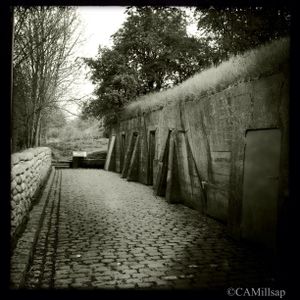Travel: The Great War Centennial 1914-1918: In Flanders Fields
When I was 12 years old, my family moved into a rambling Craftsman-style bungalow. The house had been built in the early-to-mid 1920s with all the signature details of the era including beautiful wainscoting, built-in bookcases and, in two rooms, window seats that ran the length of one wall. I spent many hours on those window seats, my forehead pressed against the glass, looking over the rooftops of the neighborhood behind us. I did a lot of reading on that cushioned seat and a lot of daydreaming.
One day, looking for a place to hide in a neighborhood game of Hide and Seek, I opened the top of one of the window seats, but there was already something in it. I pulled out a fabric-wrapped bundle that held a pair of stiff canvas objects I couldn’t identify and what looked like some kind of mask. I showed them to my grandfather, my source for the answer to all mysteries.
“Those are Doughboy gaiters and a gas mask,” he told me, turning them over in his hands.
I’d never heard of a gaiter and the only doughboy I knew anything about advertised canned biscuits. The mask was familiar, but only from movies and books. I got a quick history lesson about the First World War, the nickname for American soldiers at the time, the rough wool uniforms, legs protected by the gaiters--or leggings--that strapped and laced around a man’s calves and the gas attacks that sent soldiers scrambling, often too late, for their protective masks.
He told me I had ancestors who’d fought in the Great War, pulled out the Encyclopedia and left me to my research.
That was the start of an interest that has lasted a lifetime. The war that was to end all wars never left my mind for long after that, drawing me to books and songs and even fashions of the era. Some time in my early 20s, digging through a box of junk at a flea market, I came across a U.S. Victory Medal. Such medals were sent to every surviving soldier in 1921 to mark his service. It’s in my jewelry box now.
On the back of the medal are the words, “The War of Civilization.” If only it had been. If that war, one of the most brutal and destructive in history, had been the last, my grandfather would not have spent years in the South Pacific during the Second World War. My father would not have gone to Korea and Vietnam.
As it was, a generation was decimated, lost to not only the war, but the collateral damage of the Spanish Influenza that rode its coattails around the world. By the end, 16 million were dead and the landscape of parts of Europe was forever changed.
When the phrase “The Greatest Generation” became popular, I bit my tongue. It seemed to me the “greatest” generation was the that fought and survived that First World War. Many returned to simply pick up and go on. Others were broken completely, suffering what was called “shell shock.” That generation endured the Great War, the Great Depression and then, the ultimate cruelty, was either called to fight again again or, worse, send their sons to another unthinkable world war.
I finally made it to Belgium in 2012 and one of the stops on my itinerary was a tour of Flanders Fields, the site of so much of the horror of the Western Front. I stepped into preserved bunkers and if they chilled me on a warm spring day, I could only imagine how horrible, how dark and damp and cold, they must have been in the war, surrounded by a sea of mud, echoing the deafening barrage of shells and gunfire, filed with the sounds of the injured and dying.
At the at the Flanders Fields American Cemetery, I walked among the 368 white marble crosses reading the names, birth dates and home states--from Alabama to Washington--of the men that had fallen in the last battles before the armistice was signed in November, 1918.
I sat in what had been the “Gold Star Mothers” room, a place for visiting mothers who had lost sons and buried them in Flanders.
At the German Cemetery, a darker, more somber place, I read more names, some of them 16-year-old boys who’d been encouraged by their teachers to join up and experience what was going to be a quick rout. Startled, I saw the same name as my husband’s grandfather, a man whose family immigrated from Germany to the United States in the years before the war. It wasn’t him but it might have been a relative. No one seems to know.
I stood at the Menin Gate in Ieper (Ypres) surrounded by the names of more than 50,000 men who have no known grave. I listened as the bugler played and a wreath was laid, participating in a ceremony that has been held each evening since 1927, except during the years of German occupation in the next world war.
Now, in 2014, we’ve reached the century mark. What began with the murder of an Archduke (and his wife, although no one ever seems to mention it) and ended with the Treaty of Versailles and a shattered world, is being remembered.
If you’ve ever thought of going to Europe, or wanted to go back, this anniversary is a good time to do it. Follow the branches of your family tree. Chances are, before the great generation that went to the Second World War, you had an ancestor in the First.
Cheryl-Anne Millsap is a travel writer whose audio essays can be heard on Spokane Public Radio and on public radio stations across the U.S. She is the author of “Home Planet: A Life in Four Seasons” (available at Auntie’s Bookstore in Spokane) and can be reached at catmillsap@gmail.com
